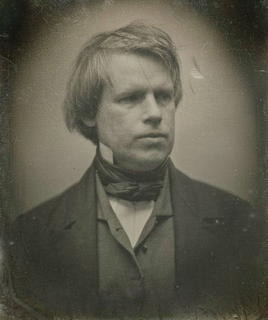A Quote by Friedrich Nietzsche
In every ascetic morality man worships a part of himself as God and for that he needs to diabolize the other part.
Related Quotes
There are plenty of good reasons for fighting...but no good reason to ever hate without reservation, to imagine that God Almighty hates with you, too. Where's evil? It's that large part of every man that wants to hate without limit, that wants to hate with God on its side. It's that part of every man that finds all kinds of ugliness so attractive....it's that part of an imbecile that punishes and vilifies and makes war gladly.
Humanism is an overemphasis on human worth and ability, leading man to glorify himself instead of God...While its historical forms may vary, humanism inevitably leads people away from God and spiritual concerns. It promotes the false idea that man is good and that he is superior to God. Secular Humanism of the twentieth century altogether rejects belief in God and worships man as God. The pride of humanism will not go unpunished.
The Church is the Church in her worship. Worship is not an optional extra, but is of the very life and essence of the Church. ...Man is never more truly man than when he worships God. He rises to all the heights of human dignity when he worships God, and all God's purpose in Creation and in Redemption are fulfilled in us as together in worship we are renewed in and through Christ, and in the name of Christ we glorify God.
I would not have every man nor every part of a man cultivated, any more than I would have every acre of earth cultivated: part will be tillage, but the greater part will be meadow and forest, not only serving an immediate use, but preparing a mould against a distant future, by the annual decay of the vegetation which it supports.
To seek after any shape of God, and to assign a form and image to Him, is a proof of man's folly. For God, whosoever he be (if haply there be any other but the world itself), and in what part soever resident, all sense He is, all sight, all hearing: He is the whole of the life and of the soul, all of Himself.
Condemn no man for not thinking as you think. Let every one enjoy the full and free liberty of thinking for himself. Let every man use his own judgment, since every man must give an account of himself to God. Abhor every approach, in any kind or degree, to the spirit of persecution, if you cannot reason nor persuade a man into the truth, never attempt to force a man into it. If love will not compel him to come, leave him to God, the judge of all.
The average man votes below himself; he votes with half a mind or a hundredth part of one. A man ought to vote with the whole of himself, as he worships or gets married. A man ought to vote with his head and heart, his soul and stomach, his eye for faces and his ear for music; also (when sufficiently provoked) with his hands and feet. If he has ever seen a fine sunset, the crimson color of it should creep into his vote. The question is not so much whether only a minority of the electorate votes. The point is that only a minority of the voter votes.
The priest therefore saw what the anchorite could not. That God needs no witness. Neither to himself nor against. The truth is rather that if there were no God then there could be no witness for there could be no identity to the world but only each man's opinion of it. The priest saw that there is no man who is elect because there is no man who is not. To God every man is a heretic.









































